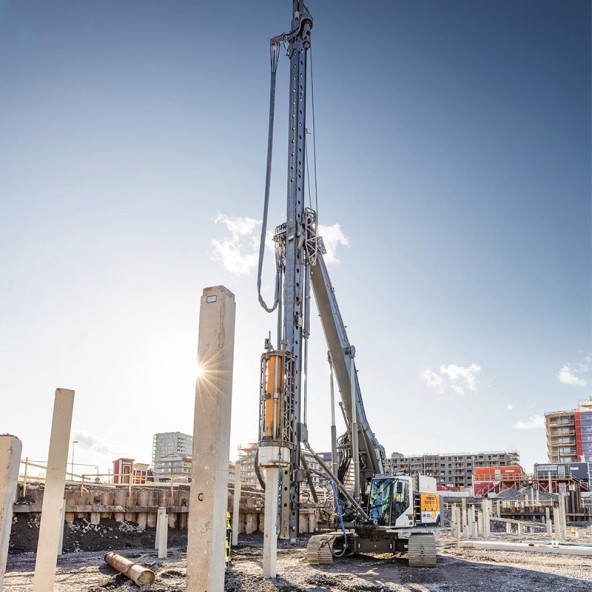Annual report 2023
Deep foundation machines
In the 2023 business year, revenue in the deep foundation machines product segment remained at the previous year’s level. At €395 million, it was merely €1 million or 0.3 % below the figure for 2022.
Revenue in € m from 396 - 0.3% |
Investments in € m from 71 - 12.7% |
Employees from 1,209 + 6.9% |
Revenue by sales regions
34.9%
European Union
10.1%
Non-EU countries
28.4%
North America
1.8%
Central and South America
11.9%
Asia and Oceania
12.9%
Africa, Near and Middle East

Volatile market environment
In 2023, the infrastructure sector, in particular, had a positive impact on the global construction industry. At the same time, high inflation and interest rates and the associated price increases halted investments in residential construction especially. Although the supply of materials fundamentally improved, Liebherr still faced bottlenecks with some suppliers in the deep foundation machines product segment, meaning that it could almost match the record year of 2022.
Uneven growth was observed in the various sales regions. Liebherr recorded moderate declines in North, Central and South America and in the European Union. Despite growth drivers, for instance from Romania and Italy, the downward trends prevailed in several individual markets. Liebherr did, however, record increased revenue in the non-EU countries and in Asia and Oceania, with growth being generated in Turkey and Japan, for example. There was also dynamic growth in the Africa, Near and Middle East sales region, driven in particular by successful projects in Saudi Arabia and the United Arab Emirates.
Liebherr is continuously developing sustainable deep foundation solutions – in particular for urban regions, to avoid greenhouse gases and reduce noise.
Expansion of the attachment series
In 2023, Liebherr launched several new attachments for deep foundation machines. These included the H 10 hydraulic hammer, which offers a high-performance solution for a wide variety of applications with a maximum impact energy of 120 kNm. The H 10 can be used on the new LRH 200 piling rig or the LRB 23 piling and drilling rig, for example, and is also suitable for use in hydraulic steelwork. Liebherr also unveiled the new LV 36 vibrator for the LRB 355.1 piling and drilling rig. The high-frequency vibrator was specially designed for common methods of soil improvement and is particularly efficient for use in producing displacement piles, as the process enables lower CO₂ emissions when producing foundation elements, such as crushed stone columns. An independent control and operating console was developed for the use of Liebherr hammers without a Liebherr basic machine – giving customers flexibility when using their attachment.
In research and development, Liebherr explored various topics. One area of focus was on recording and analysing greenhouse gas emissions in the entire product life cycle of various types of machines. The comprehensive evaluation and the identification of possible decarbonisation measures provide the basis for developing corresponding strategies and reduction targets. In the area of alternative drives, Liebherr added new product types to the electric ‘unplugged’ series. Progress was also made with a wide range of technology projects, such as the simulation of digging, drilling and milling processes.
Despite unstable conditions and uncertainty, Liebherr anticipates a positive trend in 2024 for the deep foundation machines product segment.
